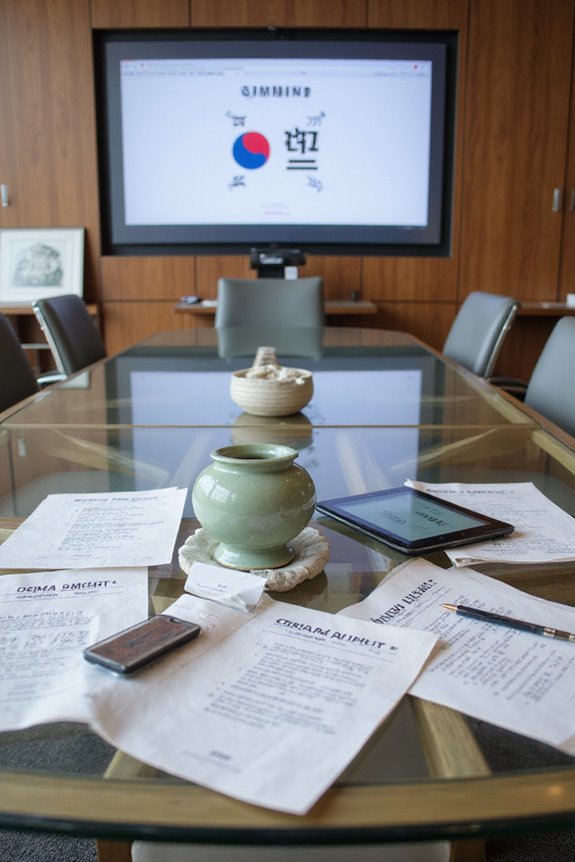Korean language proficiency offers essential business applications, enhancing communication in international partnerships. It improves negotiation processes by fostering clarity and reducing misunderstandings. Understanding Korean business culture, including hierarchical structures and etiquette, supports effective interactions. In tech and corporate sectors, these skills are increasingly sought after as global trade grows. Additionally, immersion programs provide valuable exposure to language and culture, promoting competence in varied workplace situations. There’s much more to discover about the impact of Korean proficiency on business operations.
Key Takeaways
- Korean proficiency enhances communication, building trust in international business partnerships and ensuring clear negotiations and contract understanding.
- In the tech and corporate sectors, Korean language skills are essential for navigating relationship-driven workplace cultures and technical vocabulary.
- Understanding Korean business culture, including hierarchy and etiquette, fosters stronger professional relationships and smoother negotiations.
- Korean language skills improve collaboration within multinational teams, reducing language barriers and enhancing overall team productivity.
- Participating in immersion programs enriches language skills and cultural understanding, providing valuable networking opportunities with local business leaders.
Enhancing Business Communication Through Korean Proficiency
As we navigate the evolving landscape of global business, enhancing communication through Korean proficiency becomes essential for fostering successful international partnerships. Mastering Korean allows us to break down communication barriers that could otherwise hinder stakeholder engagement. When we effectively communicate in Korean, we can establish trust with our partners, improving the clarity of our negotiations and contracts. Additionally, Korean proficiency enhances our understanding of cultural nuances, which is crucial in ensuring our messages are well-received. This fluency is especially beneficial in adapting our communication to local sociolinguistic norms, allowing us to collaborate more effectively across borders. Overall, investing in Korean language skills greatly contributes to smoother business operations and strengthens our corporate relationships, paving the way for increased trade opportunities. Furthermore, utilizing resources like Integrated Korean can provide a comprehensive approach to mastering the language, ensuring we acquire the necessary vocabulary and cultural insights for business success.
Korean Language Skills in the Tech and Corporate Sectors

Korean language skills are increasingly recognized as a valuable asset in the tech and corporate sectors, especially as South Korea continues to emerge as a global leader in technology innovation. The growth of South Korea’s tech industry, contributing 25% to the national GDP, emphasizes the need for professionals who are proficient in Korean. This proficiency aids in maneuvering the collaborative, relationship-driven workplace culture prevalent in tech firms. Intensive Korean language programs focus on practical language use and technical vocabulary, enhancing career advancement opportunities for bilingual professionals. Furthermore, the demand for Korean language skills is reflected in the booming language learning market, which is projected to grow considerably up to 2034, driven by corporate needs for effective tech integration and communication in diverse teams.
Understanding Korean Business Culture and Regulations

Understanding South Korea’s business culture and regulations is vital for effective engagement in the marketplace. In this situation, business hierarchy plays an important role; respect and formal titles should be used when addressing colleagues, particularly those in senior positions. Cultural etiquette, such as greeting with a bow and handshake, fosters trust and relationship-building. During meetings, maintaining composure is key, as emotional restraint supports smoother negotiations. Additionally, we should exhibit Kibun by avoiding direct refusals or confrontations, which can disrupt harmony. Moreover, we need to establish clear employment contracts, follow labor laws, and navigate the legal environment to guarantee compliance and foster positive workforce relations. Adhering to these principles can lead to successful interactions in the Korean business landscape.
The Role of Korean in Multinational Teams

In today’s interconnected business world, leveraging the Korean language within multinational teams can greatly enhance collaboration and efficiency. When team members can communicate in Korean, we reduce language barriers and foster a deeper understanding of each other’s perspectives. For instance, firms engaged in Korean trade saw a direct correlation between increased Korean proficiency and improved trade values. This language proficiency is particularly beneficial in high-trade areas, as it promotes smoother interactions and reduces misunderstandings. Furthermore, companies prioritizing Korean skills in their hiring practices typically achieve better team collaboration while strengthening relationships with Korean partners. By integrating Korean language skills, we not only improve communication quality but also enhance our competitive edge in the global market.
Immersion Programs for Language and Cultural Understanding

Participating in immersion programs provides a unique opportunity for individuals looking to enhance their language skills while gaining a thorough understanding of Korean culture and business practices. These programs often integrate language learning with immersive experiences that highlight the cultural exchange between South Korea and other countries. Participants engage in cultural activities, like visiting historical sites and traditional markets, which deepen their understanding of local commerce. Additionally, immersion programs provide valuable networking opportunities with local business leaders, enriching academic and professional experiences. Such programs have drawn significant interest from international students, reflecting the growing global Korean language market. Ultimately, these immersive experiences foster cultural competence essential for successful business operations in South Korea.
Industry-Specific Vocabulary for Effective Workplace Communication
Effective workplace communication in a Korean business environment hinges on the appropriate use of industry-specific vocabulary. Utilizing terms like 회의 (hoeui) for “meeting” and 협상 (hyeopsang) for “negotiation” helps us navigate discussions more efficiently. When we refer to 거래 (georae) in the context of deals, it’s important to understand the related contract terminology, such as 계약 (gyeyak). These terms allow us to articulate negotiation strategies clearly during contract discussions. We also incorporate useful phrases like “Can we set a time for the meeting?” to facilitate scheduling. Additionally, when we communicate with our 상사 (sangsa) or colleagues, using 존댓말 (jondaetmal) guarantees respect and professionalism, which ultimately leads to more effective interactions.
Frequently Asked Questions
How Long Does It Take to Become Proficient in Business Korean?
To become proficient in Business Korean, it usually takes 1 to 2 years of study. Engaging in language immersion and understanding business culture can greatly speed up our progress and help us communicate effectively.
Are There Specific Certifications for Business Korean Proficiency?
Imagine landing a job with a Korean multinational. While no specific certification programs exclusively exist for business Korean, proficiency tests like TOPIK are essential, demonstrating our language skills in professional environments to potential employers.
Can Beginners Effectively Learn Korean for Business Applications?
Yes, we can effectively learn Korean for business applications. By managing language barriers and embracing business culture, we’ll enhance our communication skills, making us better equipped for successful interactions within Korea’s dynamic business environment.
What Resources Are Best for Learning Korean Business Vocabulary?
When we’re exploring the best resources for learning Korean business vocabulary, Korean textbooks and online courses are fantastic choices. They provide structured learning, essential vocabulary, and are tailored to meet our professional communication needs effectively.
How Can I Practice Korean Language Skills Outside of Class?
We can’t just sit around waiting for fluency, right? Let’s plunge into language exchange and online courses! Engaging with others, practicing daily, and immersing ourselves in Korean media will surely boost our skills outside of class.





